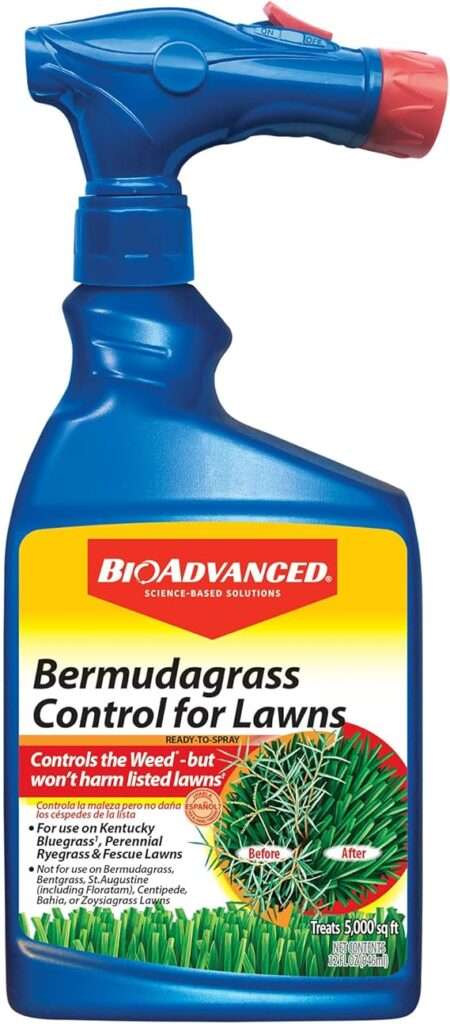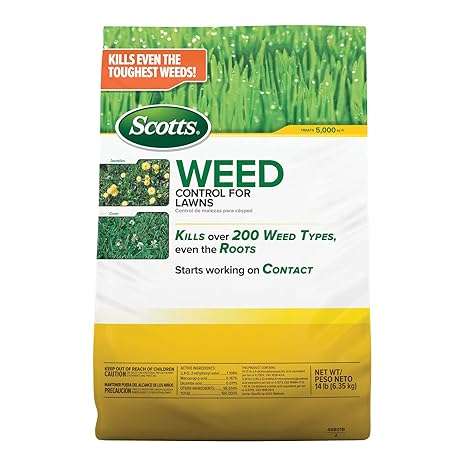Weeds can be a major nuisance in any lawn, competing with Bermuda grass for nutrients, water, and sunlight. Keeping your Bermuda grass lawn weed-free requires the right weed killer, along with a consistent care routine to prevent weed growth in the first place.
This guide will provide detailed insights into selecting and using weed killers for Bermuda grass, as well as tips for long-term weed management.
Understanding Weed Control in Bermuda Grass
Why Do Weeds Invade?
Weeds often invade lawns due to the following factors:
- Thin Turf: Sparse or weakened Bermuda grass provides space for weeds to thrive.
- Soil Issues: Poor soil health or imbalances can encourage weed growth.
- Improper Lawn Care: Overwatering, under-fertilizing, or infrequent mowing can create favorable conditions for weeds.
Types of Weed Killers for Bermuda Grass
There are two primary categories of weed killers:
1. Pre-Emergent Weed Killers
- Purpose: Prevent weed seeds from germinating.
- Common Use: Ideal for controlling annual weeds like crabgrass and goosegrass.
- Application Timing: Early spring and fall, before weed seeds germinate.
Example Products:
- Prodiamine-based products (e.g., Barricade)
- Pendimethalin-based products
2. Post-Emergent Weed Killers
- Purpose: Target and kill weeds that are already growing.
- Common Use: Effective against broadleaf weeds (e.g., dandelions, clover) and grassy weeds.
- Application Timing: During the active growth stage of weeds.
Example Products:
- 2,4-D-based herbicides for broadleaf weeds
- Quinclorac-based products for grassy weeds
Recommended Bermuda Grass Weed Killers

BioAdvanced Bermudagrass Control for Lawns, Ready-to-Spray
BERMUDAGRASS CONTROL: Selectively remove undesirable Bermudagrass weeds, without damaging your lawn
Scotts Weed Control for Lawns, Weed Killer, Kills Over 200 Weed Types Including Dandelion and Clover
This weed killer for lawns controls over 200 listed weeds, including dandelion, clover, dollarweed, chickweed, poison ivy, henbit, oxalis, ground ivy, and purslane

Weed Killers Safe for Bermuda Grass
Not all weed killers are safe for Bermuda grass. Some herbicides can damage or kill your turf. Here are options that are generally safe when used correctly:
Selective Herbicides
- Target specific types of weeds (broadleaf or grassy) without harming Bermuda grass.
- Examples:
- Celsius WG Herbicide: Controls a wide range of weeds, including broadleaf and sedges.
- Spectracide Weed Stop for Lawns: Affordable and effective for common lawn weeds.
Non-Selective Herbicides
- Kill all vegetation, including Bermuda grass.
- Use these only for spot treatments or to clear areas for reseeding.
- Example: Glyphosate (e.g., Roundup)
Best Practices for Applying Weed Killers
- Read the Label
- Follow manufacturer instructions for dilution rates, application timing, and safety precautions.
- Apply at the Right Time
- For pre-emergents: Apply early in the growing season.
- For post-emergents: Apply when weeds are actively growing.
- Choose Optimal Weather Conditions
- Apply when the temperature is between 65°F and 85°F.
- Avoid windy days to prevent drift onto desirable plants.
- Spot Treat When Possible
- Focus on affected areas to minimize chemical use and reduce stress on your Bermuda grass.
- Watering Guidelines
- Pre-emergents: Water lightly after application to activate the herbicide.
- Post-emergents: Avoid watering for at least 24 hours after application.
Common Weeds in Bermuda Grass and How to Treat Them
1. Crabgrass
- Appearance: Coarse blades, spreading growth habit.
- Treatment: Use a pre-emergent like Prodiamine in early spring.
- Post-emergent Option: Quinclorac-based products.
2. Dandelions
- Appearance: Bright yellow flowers, long taproots.
- Treatment: Spot-treat with 2,4-D-based herbicides.
3. Clover
- Appearance: Small, three-leaf clusters with white or pink flowers.
- Treatment: Apply broadleaf weed killers like Triclopyr or 2,4-D.
4. Sedges (e.g., Nutsedge)
- Appearance: Grass-like but with triangular stems and fast growth.
- Treatment: Use herbicides with halosulfuron or sulfentrazone.
Preventing Weeds in Bermuda Grass
Preventative care is the most effective way to keep weeds at bay:
- Mow Regularly
- Maintain a mowing height of 1–2 inches to discourage weed growth.
- Fertilize Properly
- Apply balanced fertilizers to strengthen Bermuda grass, making it more competitive against weeds.
- Aerate the Lawn
- Annual aeration improves soil health and reduces compaction, which discourages weed growth.
- Irrigate Wisely
- Water deeply and infrequently to encourage deep Bermuda grass roots and weaken shallow-rooted weeds.
- Overseed Annually
- Fill in bare or thinning spots with Bermuda grass seed to crowd out weeds.
Conclusion
Weed control is essential for maintaining a healthy and beautiful Bermuda grass lawn. By choosing the right type of weed killer, applying it correctly, and following a consistent lawn care routine, you can enjoy a lush, weed-free lawn year-round.